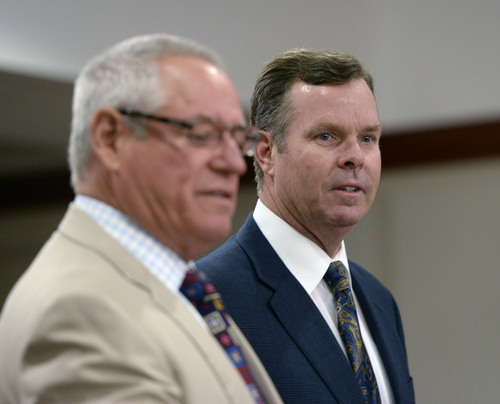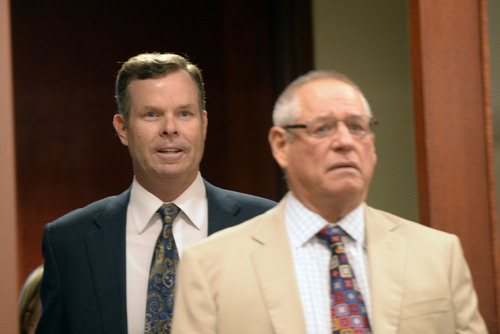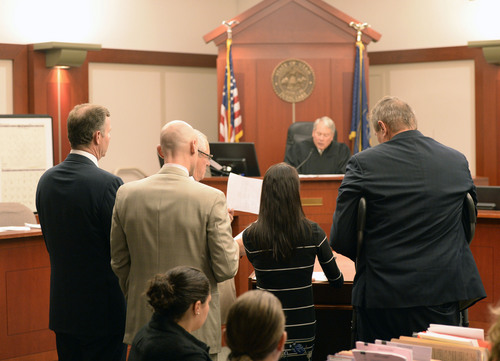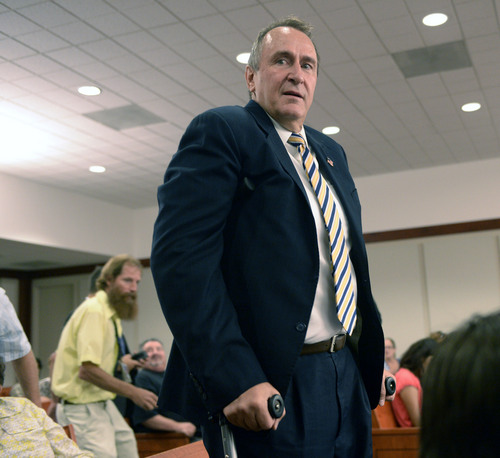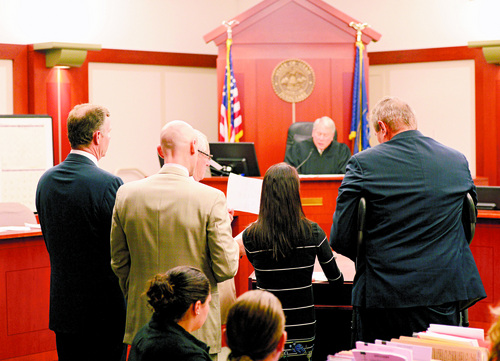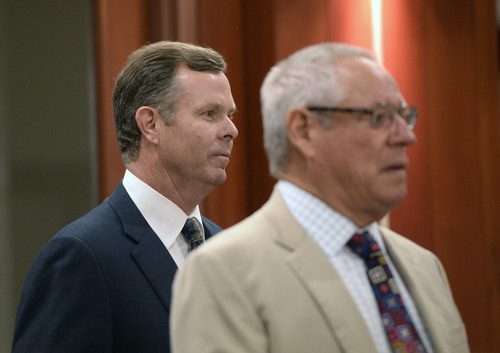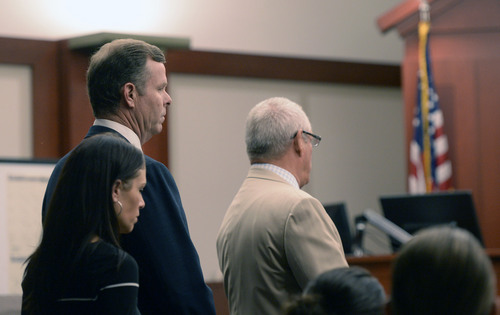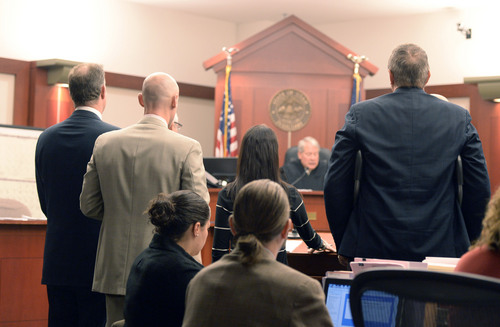This is an archived article that was published on sltrib.com in 2014, and information in the article may be outdated. It is provided only for personal research purposes and may not be reprinted.
After he was arrested and charged with 10 felonies alleging he had misused his office, former Republican Attorney General Mark Shurtleff complained loud and long that the case against him was a politically motivated hit, ordered by Democratic Salt Lake County District Attorney Sim Gill.
Gill denied party played into the charges, noting they were made in conjunction with Davis County Attorney Troy Rawlings, a Republican, and based on findings not just from investigators with the FBI and Utah Department of Public Safety, but also from the Republican lieutenant governor's office and a GOP-led House committee.
Even so, Gill and Rawlings offer a simple solution: Make elections for top law enforcement positions — from state attorney general to county attorney to county sheriff — nonpartisan.
"The point is that certain institutions require a certain level of trust where just doing your job invites that criticism, and it ought to be beyond that criticism," Gill said. "By making them into nonpartisan positions, then you remove the politics and there are still appropriate checks and balances. … You let the professionals in those respective institutions just do their job."
In Utah, jobs such as fire chief, police chief and medical examiner aren't partisan, Gill notes, because they are viewed as professional posts.
"Well, the law — and following the law and application of the law — is exactly that, as well," Gill said. "We would still retain the best elements of participatory democracy, but we would remove from it the worst elements of partisanship."
Rawlings has been pushing for years to strip partisanship from county attorney races, he said, even approaching three legislators with the idea.
"All of them told me I was crazy for even mentioning it," he said.
While the core functions of the office are nonpartisan, he said, the prosecutors still have to run the party's gantlet to get the nomination. They attend party events, meetings and fundraisers, although Rawlings said he bypasses party functions.
"Talking like this is heresy, I guarantee you, in the Republican Party," Rawlings said. "But I really feel like our jobs are apolitical. Justice should be blind in reality, not just in rhetoric."
A pared-down plan is having the attorney general appointed, rather than elected. Sen. Todd Weiler, R-Woods Cross, offered a constitutional amendment to do just that during the past legislative session. It got little traction.
When he proposed the amendment, Weiler said, he believed Shurtleff and his anointed successor, then-Attorney General John Swallow, would be charged before the end of the 2014 legislative session, which he figured would prompt lawmakers to make the change. Now that they have been charged, he said, the landscape has shifted some, but the idea may not return.
"I'm not going to bring it back until there is a conviction of either Swallow or Shurtleff," Weiler said. "I think it will take that type of sea change to get two-thirds [support needed to amend the Utah Constitution] in the Senate or the House."
Gill said appointing the attorney general isn't the solution, because it merely transfers the partisan pressures. In addition, voters lose the ability to boot an attorney general out of office.
De-politicizing elections for law enforcement posts and appointing the attorney general are just two of dozens of suggestions for changes that have flowed from the scandal hounding Swallow and Shurtleff, who face a combined 23 criminal counts for allegedly operating a high-stakes pay-to-play scheme. Both vigorously deny the charges and insist they will be cleared.
Some reforms were quickly adopted; others met resistance.
Rep. Jim Dunnigan, R-Taylorsville, who led the House committee that investigated Swallow, said the panel's final report included a laundry list of nearly four-dozen proposals, most of them meant more as fodder for discussion than hard-fast recommendations.
Still, he argues that the already-enacted reforms — toughening conflict-of-interest disclosures, strengthening campaign-finance transparency and increasing the Legislature's ability to investigate future misdeeds — will serve the public well.
"We have helped create a better climate for disclosure and transparency that I think helps the electoral process and hopefully will discourage or dissuade future campaigns from trying to take advantage," Dunnigan said. "That said, part of what we do every legislative session is address loopholes."
For now, he said, it may be best to wait and see how the changes help. But some argue the measures don't go far enough.
Maryann Martindale, executive director of the progressive Alliance for a Better Utah, said the Republican-dominated Legislature essentially tried to make the issue all about two men — Shurtleff and Swallow — building a fire wall around them instead of taking on the more pervasive, systemic issues in Utah's political system.
"It really has felt very much like, 'Well, we got 'em. Shurtleff and Swallow are out,' " she said. " ... It's too easy to do that. It's natural to do that, I understand. As an official, the last thing you want to do is start drawing attention to other potential violations, but it does nothing to restore the public trust."
Here is a look at the changes in place and others being proposed:
—
Conflicts of interest • The morning Swallow filed to run for attorney general, he was an officer in P-Solutions. By day's end, that had changed. He had transferred sole ownership to his wife, Suzanne.
He made no mention of his stake in that company or several others on his candidate conflict-of-interest disclosure. Nor did he list nearly $60,000 in income he had been paid for consulting jobs that should have been disclosed, an investigation by the lieutenant governor's office found.
"The nondisclosure was planned and deliberate," the report said, "and executed in two separate filings."
The 2014 Legislature significantly expanded financial-reporting requirements for candidates.
"We beefed up the conflict-of-interest reporting," Dunnigan said. "It causes our reporting form to double from two pages to four pages."
Candidates now are required to itemize business interests and sources of income for a year before running for office as well as business interests and income of a spouse.
The 2013 Legislature also limited the kind of consulting work executive branch employees could do and created an ethics commission to oversee those agencies.
—
Obstructing House investigations • As investigators for the Utah House delved into Swallow's alleged misconduct, they noted a disturbing pattern of behavior that seemed to begin after a meeting at an Orem Krispy Kreme with Jeremy Johnson.
A St. George businessman, Johnson had sought Swallow's help in staving off a federal investigation of Johnson's I Works business.
Swallow obliged, introducing Johnson to Richard Rawle, the late payday-loan magnate who supposedly could — for a $250,000 payment — enlist the help of Senate Majority Leader Harry Reid, D-Nev., to derail the probe.
But after federal investigators seized Johnson's assets and arrested him, he and his partner demanded their money back, culminating in the 2012 doughnut shop encounter.
Swallow was so shaken by the meeting, House investigators posited, that he embarked on a path of data destruction and fabrication to cover his tracks.
Data and emails were erased or missing from numerous computers, storage devices and phones that belonged to Swallow.
Invoices and calendar entries for consulting work were provided to investigators, who later discovered they had been created months after the fact and conflicted with the hours Swallow claimed to have been working for the state.
The committee concluded that Swallow's actions "were part of a concerted effort to evade and obstruct any future investigation into his conduct."
But there was nothing investigators could do. It was not a crime to obstruct a legislative investigation.
HB390, sponsored by committee member Rebecca Chavez-Houck, D-Salt Lake City, now makes it a class A misdemeanor, punishable by up to a year in jail, for anyone to obstruct any future legislative inquiry.
—
Campaign-finance reporting • Despite earning a comfortable victory in the Republican attorney general's primary and crushing his Democratic opponent in the general election, Swallow still spent nearly as much on his campaign as Gov. Gary Herbert.
How did he spend all that money?
No one outside the campaign really knows because most of the spending was concealed by lumping it together into huge payments — totaling nearly half a million dollars — to Guidant Strategies, run by his campaign consultant, Jason Powers.
That was another transparency issue lawmakers moved to fix. Legislation passed this year now requires candidates to itemize how consultants spend the money they are paid.
—
'Dark money' reporting • In 2012, Rep. Brad Daw fell prey to an onslaught of attacks funded by an unknown source.
The House investigation later found the barrage that brought down Daw was bankrolled by the payday-lending industry with money Powers laundered through a series of nonprofits and political-action committees to hide the true source.
Daw had sponsored legislation to regulate payday lenders, and the industry exacted its revenge.
After Daw lost, Rep. Greg Hughes, R-Draper, sponsored legislation to try to cast some sunlight on so-called "dark money," which had required little disclosure. Now corporations, including nonprofits, are required to disclose money they spend on political campaigns.
—
More left undone? • Martindale insists Utah needs a truly independent statewide ethics commission — without elected officials on it — as recommended several years ago by a task force appointed by then-Gov. Jon Huntsman.
The lieutenant governor's office, responsible for monitoring and enforcing election laws, is overworked and understaffed, she said. And, finally, Utah needs campaign-contribution limits.
That last point has been pushed by mostly Democratic legislators through the years, but always failed. Utah is one of just a few states where any individual or corporation can donate any amount.
Rep. Brian King, D-Salt Lake City, sponsored contribution limits this year and plans to try again, saying he has been promised a committee hearing in September.
"The Swallow-Shurtleff situation illustrates," King said, "how, with no campaign-contribution limits at all, it's easy for people .... to pour money into a race and have a disproportionate impact, both on the candidate's ability to get elected and the candidate's feeling that they're beholden to someone."
Weiler accuses Democrats of using the scandal to push an agenda they have espoused for years. The arguments they make don't hold water, he said, and it is the wrong time to enact sweeping new laws.
"We shouldn't do it in this frenzied atmosphere," he said.
Besides, he noted, the fact that Swallow and Shurtleff are in court defending themselves against a litany of criminal charges shows — at least from the prosecutors' perspective — laws were in place to prohibit what they are accused of doing and that the system worked.
gehrke@sltrib.com Twitter: @RobertGehrke —
Hearing set
O Former Utah Attorneys General John Swallow and Mark Shurtleff are scheduled to appear Aug. 18 in 3rd District Court. See the charges • A11


